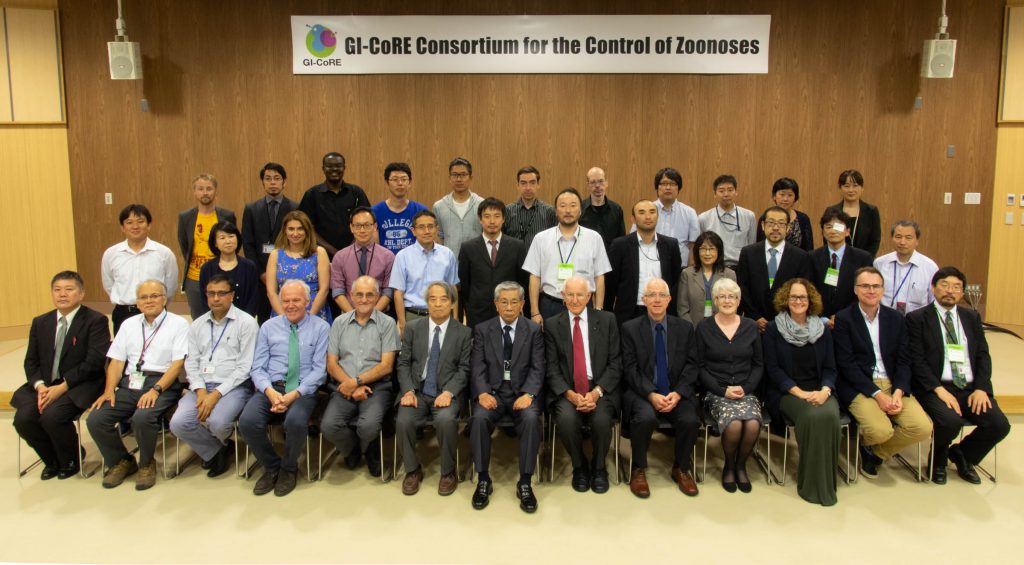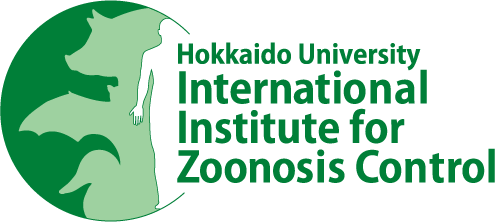July 20,2018
The Sixth Meeting of the Consortium for the Control of Zoonoses
The Sixth Meeting of the Consortium for the Control of Zoonoses was held on July 19 and 20, 2018 at the Faculty of Veterinary Medicine, Hokkaido University. The symposium was attended by 191 people in total; including 10 researchers from the University of Melbourne, University College Dublin and King Abdullah University of Science and Technology, and 14 researchers from Global Station for Zoonosis Control, GI-CoRE, Hokkaido University. Presentations were made on the progress of the on-going international collaborative research of the GI-CoRE project over the four years since it began in April 2014. These presentations were followed by an active question and answer session. The progress and future plans for new research projects starting from 2017 were also presented. The consortium meeting provided a meaningful opportunity to confirm our continuous promotion of basic research, applied research and clinical research for the control of zoonoses and to strengthen international collaboration between the four universities.

The Sixth Meeting of the Consortium for the Control of Zoonoses
Host: Global Station for Zoonosis Control, GI-CoRE, Hokkaido University
Co-Host: The Research Center for Zoonosis Control and Faculty of Veterinary Medicine, Hokkaido University
Date: Thursday July 19 and Friday July 20, 2018
Venue: Lecture Hall, Faculty of Veterinary Medicine, Hokkaido University (Kita 18, Nishi 9, Kita-ku, Sapporo)
Language: English
Programme:
19th July Session 1
15:40 Opening remarks by Professor Hiroshi Kida, Head of the Research Center for Zoonosis Control, Hokkaido University
15:45 General introduction of the GI-CoRE project by Director of the Global Station for Zoonosis Control, GI-CoRE, Hokkaido University
15:50 Presentation of new research projects
1. Role of microglia on the neuropathobiology of prion diseases
Prof. Motohiro Horiuchi, Hokkaido University
2. Genetic analyses of multidrug-resistant Mycobacterium tuberculosis clinical isolates
collected in Asian and African countries
Dr. Chie Nakajima, Prof. Yasuhiko Suzuki, Hokkaido University
3. Development of anthrax vaccine based on structural information of anthrax toxins
Dr. Manabu Igarashi, Prof. Hideaki Higashi, Hokkaido University
4. Screening of drug candidates against Ebola virus disease
Prof. Ayato Takada, Hokkaido University
5. Antimicrobial resistant Escherichia coli and Salmonella from pigs and pork in Thailand
Dr. Norikazu Isoda, Hokkaido University
20th July Session 2
9:30 Welcome address by Executive/Vice President/GI-CoRE Deputy Director, Hokkaido University
9:40 Presentation by unit for pathogen genomics
1. Development of diagnosis-by-sequencing method for infectious diseases
Dr. Junya Yamagishi, Hokkaido University
2. Genome-wide analysis of horizontal gene transfer in protozoan parasite genomes
Prof. Chihiro Sugimoto, Hokkaido University
3. Towards our better understanding of zoonotic malaria parasites – using
genomics- driven approaches
Prof. Arnab Pain, King Abdullah University of Science and Technology
4. The impact of Legionella infection on host cell transcription
Prof. Elizabeth L. Hartland, the University of Melbourne
10:25 Presentation by unit for exploration of pathogens
1. GI-CoRE : progress and update on the internationalisation of the programm
Prof. William W. Hall, University College Dublin
2. Virus discoveries in African nonhuman primates and bats and transcriptomic
responses of human neuronal cells to Japanese encephalitis virus infection
Dr. Michael Carr, University College Dublin
3. Epidemiological and basic research activities for the control of viral zoonoses
Prof. Hirofumi Sawa, Hokkaido University
4. Collaborative mycobacterial research and graduate student activities in GI-CoRE
Prof. Stephen Gordon, University College Dublin
11:25 Welcome address by Ronald D. Green, Consul, Australian Consulate in Sapporo
11:30 Presentation by unit for development of vaccines and biologicals
1. Development of a safe and radically effectual seasonal influenza vaccine of global
standard
Prof. Hiroshi Kida, Hokkaido University
2. Immunomodulators : new trends in vaccine design and immunotherapeutics
Prof. David C. Jackson, the University of Melbourne
3. Predicting the severity of influenza pandemics
Prof. Lorena E. Brown, the University of Melbourne
12:15 Closing remarks by Professor Hiroshi Kida, Head of the Research Center for Zoonosis Control, Hokkaido University
For details, please contact:
GI-CoRE Global Station for Zoonosis Control
TEL: +81-11-706-9555
Mail: gsz@oia.hokudai.ac.jp













